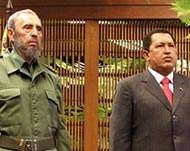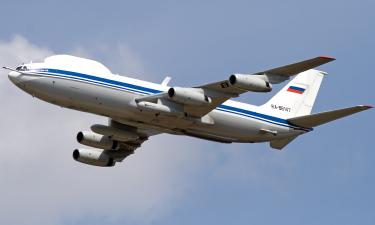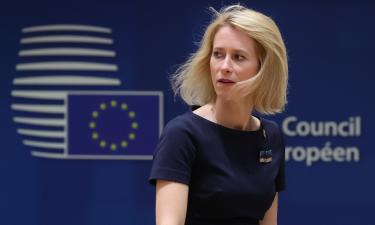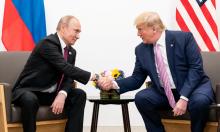Cuba and Venezuela slam US Free Trade Area of the Americas
 Both nations proposed a more equal alternative based in mutual cooperation rather than in pure pro-market policies.
Both nations proposed a more equal alternative based in mutual cooperation rather than in pure pro-market policies.
In a new bid to challenge the US backed Free Trade Area of the Americas, Cuban President Fidel Castro and Venezuelan President Hugo Chavez Tuesday announced in Havana an alternative bloc for the region based in mutual cooperation among states rather than in pure pro-market policies. Naming the new pact the Bolivarian Alternative for the Americas (ALBA), the presidents said it would eliminate trade barriers and tax obstacles, provide incentives for investment, increase banking relations and tourism cooperation.
The idea comes exactly a week after regional leaders signed a compromise to create a EU-alike Community of South American Nations, an attempt to unify the continent in 15 years in terms of trade, political and macroeconomic institutions, as a common currency and a common parliament.
Castro said the alternative was conceived as "a battle fought with the same rules and regulations as those imposed by the [US] empire to divide the people". In turn, Mr. Chavez addressing a crowd in Cuba's Capital remarked that the ALBA "is an alternative to the perverse FTAA, which they have been trying to impose on us for years," Chavez said. "FTAA is dead."
Chavez also accused Washington of pursuing imperialist intentions in free trade talks with Andean countries.
In return, Washington has expressed concern over Chavez's close ties to Castro since won the presidency in 1998. More recently, the Bush administration has been trying to frustrate a Chavez bid to modernise the Venezuelan armed forces with Russian equipment, by rising concern on the operation among neighbour nations.
At the time Chavez and Castro were holding bilateral talks to increase cooperation -Venezuela currently provides Cuba with 53,000 barrels of oil a day at preferential prices, while Cuba has 13,000 doctors in Venezuela, is helping the country stamp out illiteracy and has treated thousands of Venezuelans in its hospitals- the US administration began expressing concern over Chavez's new domestic policies, which threat, according to Washington, civil freedom.
On other issues, Venezuela promised financing for Cuban industrial and infrastructure projects, while Cuba agreed to pay a minimum price of $27 per barrel of Venezuelan oil, as part of the accord "to apply the Bolivarian Alternative for the Americas."
Subscribe to Pravda.Ru Telegram channel, Facebook, RSS!




